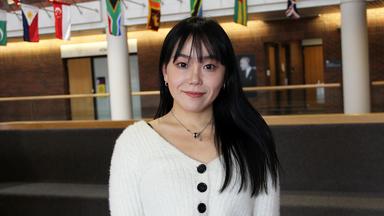225 Humphrey School
301 19th Avenue South
Minneapolis, MN 55455
United States
The Doctor of Philosophy (PhD) in Public Affairs offers rigorous, advanced study that prepares researchers to enter academia or join highly respected institutions involved in cutting edge research in public affairs, policy, planning, and management/governance.
Successful applicants are clear about their research interests and why the Humphrey School is the best place to do that research. Students are expected to make original theoretical, methodological, or substantive contributions in one of four specialization areas: Public Policy; Urban Planning; Management and Governance; or Science, Technology, and Environmental Policy.
Students are advised by highly accomplished faculty members with research expertise and experience. The curriculum includes a common set of core classes, customized courses in one of the four specializations, and completion of a dissertation. Each specialization requires advanced training in theory, research design, statistics, and other quantitative and qualitative methods. Students also complete training in pedagogy and gain experience in teaching.
Curriculum
The curriculum of the doctorate of philosophy (PhD) in Public Affairs is customized based on educational background of the student, the student’s research interests, and the student’s academic sub-plan.
Students who enter the program with only a bachelor’s degree must complete, prior to completion of the PhD, one of these four master’s degrees:
- Master of Public Policy (MPP)
- Master of Urban and Regional Planning (MURP)
- Master of Science in Science, Technology, and Environmental Policy (MS–STEP)
- Master of Development Practice (MDP)
For students who already hold a master’s degree, the curriculum requires a minimum of 36 credit hours, including 24 hours of thesis credit. For students with only a bachelor’s degree, the curriculum requires a minimum of 63 credit hours, including 24 hours of thesis credit.
Applicant profile
Admission to the PhD program is highly selective and competitive. The PhD program enrolls a limited number of students annually to ensure opportunities for close collaboration with faculty advisors and mentors and the availability of financial assistance. Admitted students are provided financial aid in the form of tuition fellowships, stipends, or research or teaching assistantships.
The School welcomes candidates from all fields. Successful applicants to the program will be clear about the research they wish to undertake and why they think the Humphrey School is the best place to do that research. Most students admitted into the program will hold a master’s degree from an accredited college or university, although exceptionally well-qualified candidates with bachelor’s degrees will be considered. The Humphrey School’s mission is to inspire, educate, and support innovative leaders to advance the common good in a diverse world, and seeks highly qualified, diverse candidates for all of its programs.
Program fit
Experts in our field have identified factors that contribute to the success of doctoral students. Two of these factors are whether students have strong faculty advising and financial support. Students who have strong relationships with faculty mentors based on shared research interests and who receive funding from their school or department are more likely to be successful in completing their doctorates than those who do not. Research also shows that full-time students are more likely to complete their degrees than part-time students.
Because our goal is to help each student we admit succeed, we will limit admissions to those applicants with research interests closely aligned with the interests of one or more of our faculty members. In addition, the number of applicants we admit will be constrained by the amount of funding we have to support students. For these reasons, the number of students we admit annually is likely to be small, and the selection process will be competitive. Qualified applicants with strong GPAs, GRE scores, and letters of recommendation who otherwise would be strong candidates may not be admitted if their research interests are not a good match with those of a faculty member.
As an applicant, in your “Statement of Purpose and Research Interests,” it is important for you to be as clear as possible about your research interests and how they align with the interests of a faculty member. We understand your interests will evolve over time, but clarity and specificity in your application will maximize the probability of admission.
We encourage you to review our faculty biographies to identify faculty members who are doing research related to your interests and read some of their papers to confirm that your interests align with theirs. This type of exploratory work will help you determine whether the Humphrey School is the best place for you to pursue a doctorate. From the biography page, which lists brief descriptions of research expertise, click on the name of a person whose interests align with yours for further details about their work, including specific research and publications.
Funding
All applicants to the PhD in Public Affairs will automatically be considered for financial support. Students admitted to the doctoral program are provided a minimum of four years of full financial assistance in the form of tuition benefits, stipends, and research or teaching assistantships or will be supported through innovative partnerships with research collaborators. Because the financial support pool is limited, admission to the PhD program is selective and highly competitive. Continuation of funding will be dependent on annual progress towards the doctoral degree.



